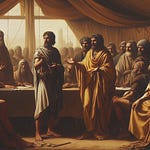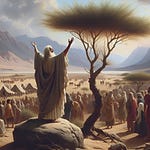Chapter Notes
Have you ever contemplated how in the Old Testament and the New God calls His people to remember the cost of redemption?
In Exodus 12, God institutes the Passover, providing a way of deliverance for Israel while executing His righteous judgment on Egypt.
Commentary
vv. 1–11: God establishes the Passover as the beginning of a new calendar for Israel, symbolizing that redemption marks a new life (v. 2). Each household was instructed to select an unblemished lamb on the tenth day of the first month and keep it until the fourteenth day (vv. 3–6). This lamb, prefiguring Christ’s sinlessness, would then be sacrificed at twilight. The blood of the lamb was to be applied to the doorposts and lintel of each house, serving as a sign to shield them from the coming judgment (v. 7). The lamb was to be roasted with fire and eaten with unleavened bread and bitter herbs (v. 8), symbolizing judgment, purity, and remembrance of suffering. None of the lamb’s remains were to be left until morning, emphasizing the completeness of the sacrifice (v. 10). The meal was to be eaten in haste, with the people dressed and ready to leave, signifying their preparation for the exodus and the urgency of their redemption (v. 11).
vv. 12–20: God declares that He will pass through Egypt, striking down every firstborn, both human and animal, as a judgment on Egypt (v. 12). The blood of the lamb would serve as a sign of atonement, sparing the Israelites from destruction (v. 13). This act illustrates the centrality of the blood as the basis of redemption. God then institutes the Feast of Unleavened Bread, to be observed for seven days following the Passover (vv. 14–20). During this time, no leaven was to be found in their homes, symbolizing the removal of sin and the necessity of purity in those redeemed by God.
vv. 21–28: Moses conveys God’s instructions to the elders of Israel, commanding them to select lambs, slay them, and apply the blood to the doorframes using hyssop (vv. 21–22). The people were instructed not to leave their houses during the night of judgment, for the Lord Himself would pass through to strike the Egyptians, but He would shield the homes marked by the blood (vv. 23–24). This act was to be commemorated perpetually as a reminder of God’s deliverance, to be explained to future generations as “the sacrifice of the Lord’s Passover” (vv. 25–27). The people bowed in worship and obeyed, demonstrating their faith and submission to God’s Word (v. 28).
vv. 29–36: At midnight, God struck down all the firstborn in Egypt, from Pharaoh’s household to the lowest servant and even the livestock, resulting in unparalleled mourning throughout the land (vv. 29–30). Pharaoh, broken by the devastating judgment, summoned Moses and Aaron, commanding the Israelites to leave immediately (vv. 31–32). The Egyptians urged the Israelites to depart quickly, fearing further destruction. As foretold, the Israelites asked for silver, gold, and clothing, and the Egyptians willingly gave these items, fulfilling God’s promise that they would plunder their oppressors (vv. 33–36).
vv. 37–51: The Israelites, numbering about 600,000 men, plus women and children, departed from Rameses to Succoth, carrying unleavened bread because they left in haste (vv. 37–39). Their 430 years in Egypt came to an end, fulfilling God’s promise to deliver Abraham’s descendants (vv. 40–41). God reiterates the perpetual ordinance of the Passover, specifying that only those who are part of the covenant community, marked by circumcision, may partake (vv. 42–49). The chapter concludes with Israel’s obedience to all God commanded, marking the beginning of their journey to freedom (vv. 50–51).
Application
Redemption Demands Preparation and Separation. The Israelites were instructed to prepare the lamb, remove leaven, and eat the Passover meal in haste, symbolizing readiness to leave Egypt and separation from sin (Exodus 12:6-8). True faith must act upon God’s commands. Believers are likewise called to live as pilgrims, ready to forsake the world and its corruptions (1 Peter 1:13-15). Are you spiritually prepared to follow God’s call, leaving behind anything that hinders your walk with Him?
God’s Judgment and Mercy Reveal His Holiness. The death of Egypt’s firstborn reveals God’s righteous judgment against sin (Exodus 12:12), while the sparing of Israel highlights His mercy toward those under the blood. These truths meet at the cross, where God remains both just and the justifier (Romans 3:25-26). Remember, God’s sovereignty governs both judgment and deliverance. Does your view of God balance His justice with His grace, and does this lead you to worship Him in awe?
Faith Must Result in Obedience. The Israelites demonstrated their faith by applying the blood, staying inside, and eating the Passover as commanded (Exodus 12:21-28). As James teaches, true faith is active and results in obedience (James 2:17). Are you living out your faith through obedience, trusting God’s promises even when they seem contrary to human understanding.
God Provides for His People Even in Their Trials. God caused the Egyptians to give the Israelites silver, gold, and clothing as they departed (Exodus 12:36). This provision equipped them for their journey and future worship. Just as God provided for Israel, He supplies all we need for life and godliness in Christ (2 Peter 1:3). Are you trusting Him to meet your needs as you follow His leading, even in challenging circumstances?
Redemption Creates a New Identity and Demands Remembrance. The Passover marked the beginning of a new calendar for Israel (Exodus 12:2), signifying their deliverance as God’s covenant people. Believers, too, are made new creations in Christ (2 Corinthians 5:17). The Passover feast became a perpetual memorial for Israel to teach future generations of God’s mighty works. Do you faithfully remember Christ’s sacrifice through worship, the Lord’s Supper, and sharing the gospel with others?
The Blood of Christ Is the Sole Basis of Deliverance. God’s judgment passed over the Israelites not because of their righteousness but because of the blood on their doorposts (Exodus 12:13). This powerfully foreshadows the gospel, where salvation comes through faith in Christ’s blood, not by works (Ephesians 2:8-9). Have you placed your faith in the blood of Christ as your only refuge from God’s wrath? If not, do so today.
“It is not possible for God to reject you if you come this day to Him pleading the blood of Christ. God cannot—and here we speak with reverence too—the everlasting God cannot reject a sinner who pleads the blood of Christ, for if He did so, it were to deny Himself, and to contradict all His former acts. He has accepted blood, and He will accept it.” — Charles Spurgeon











